- Home
- Edward Lee
City Infernal Page 9
City Infernal Read online
Page 9
Pure fuckin’ angelfood cake.
Skin like hot white chocolate and big cherry bonbons for nipples. And all that skimpy black pinko weirdo shit she wore was just the ticket for any redneck voyeur. Jervis didn’t care for that whacked-out Goth crap she listened to; he’d snuck into her room a few times when she was out and looked at her CD covers. Mostly fellas dressing up like gals and wearing make-up and the like. He’d take Charlie Daniels any day. Didn’t matter to him, though, what kind of shit she listened to. Jervis just wanted to see the tits and the cookie, and that trim white stomach and little bellybutton that just made him want to haul back and do a rebel yell—with his hand in his pants of course.
The life of a voyeur was intricate and bizarre.
But after almost three hours up here, kneeling in the musty closet with his eye to his peephole, Jervis wasn’t getting much in the way of treats.
She sat around on her bed or at her desk in a jean skirt and fancified black bikini top, mostly listening to that hippie Goth crap or reading books. Jervis would’ve liked the short jeans—except the denim was black. Black denim? he thought. Dumbest-ass thing I ever done seen. These freaky Goth kids, all they ever wear is fuckin’ BLACK! Nor did he care for the diminutive rainbow tattoo over her cute little bellybutton. It seemed like vandalism, like spray paint on a gorgeous canvas. Why did gals these days insist on messin’ up their bods with all that hippie tattoo business?
Time just kept ticking by. Would she ever get undressed and go to bed?
Aw, come on! Let’s get down to it!
At ten o’clock, she gave no indication of turning in. Jervis heard her saying goodnight to her father out in the hall, heard the old man go to bed himself, but after that she just came back to her room listening to more of that weirdo music. At least now she listened with headphones, so Jervis didn’t have to hear all the groaning and screaming lyrics about the anti-Christ superstar or some such shit, and kids killing themselves. But Jervis was pretty much trapped in the lightless closet, and wouldn’t be able to head back home until after she’d gone to sleep.
Which it didn’t look like she had any intention of doing.
Come on, you yellow-hairt little city bitch! I ain’t got all night! Get them clothes off and give Jervis some stroke time!
It seemed, then, he’d get his wish. She took off her headphones, looked at her watch, and stood up.
Get that shit RIGHT OFF! I want that dumbass-looking black skirt ON THE FLOOR! Get that bra and little panties the fuck OFF!
That’s when the clock downstairs struck midnight.
It almost seemed like a signal. When the clock struck, Cassie turned off the light and left the room.
Daaaaaaag-NABIT!
Jervis remained kneeling in the dark, knees aching—with nothing for his effort.
He could hear her going down the hall, her flipflops flopping. Then the flopping stopped at what he guessed must be the landing.
He didn’t hear her go down.
Very carefully. he rose, hoping his knees wouldn’t crack. He tiptoed to the door and knelt again, at the old-fashioned keyhole. He looked out.
There she was, standing at the landing, right next to the other stairwell that led up to the oculus room.
He knew it was his imagination—simply compounded by the dark and the late hour—but for a moment he actually thought he heard footsteps coming down from the oculus room. Naw, that’s silly. There ain’t no one up there.
How could there be?
Yet Cassie remained standing there, looking up now, as if waiting for someone to come down....
He heard her whisper: “My father’s asleep. We can go now.”
But no one else stood on the landing.
Now who in the HAIL is she talkin’ to?
Cassie turned on the barely-lit landing, began to descend the stairs to the first floor.
She was alone.
But she continued to whisper, and the last thing Jervis thought he heard her say was:
“Don’t worry, I got ’em. I got the bones....”
(II)
Via, Xeke, and Hush arrived as they’d said, at midnight. Midnight was the best time for a “Pass,” Cassie was told, simply due to the human meaning it had accrued over the last millennia. “Where we live, Etherics are tangible,” Xeke had said aside. “What’s cosmic or spiritual in your world is hard science in ours.”
Cassie didn’t even pretend to understand.
They traversed the dark, silent house, Via and Xeke leading the way. Hush had clearly formed a bond with Cassie, touching her and holding her hand whenever possible. The contact was not erotic or sexual in the least but something sisterly, as though Hush regarded Cassie as an elder sibling. The younger girl’s hand felt hot, which struck Cassie as odd. Hush was dead. Shouldn’t her hand be cold?
But then Cassie reminded herself that her new colleagues weren’t really dead at all. Dead was a subjectivity. In their own plane of existence, they were very much alive. They were as alive as Cassie was in her own world, the Living World.
“God, your aura’s really strong,” Via told her.
“I can feel it,” Xeke added.
“It’s lighting up the whole downstairs!”
Again, Cassie was mystified. On the first floor, she saw nothing in the way of luminescence, felt nothing that could be described as an emanation of her lifeforce. Guess I’ll just have to take their word for it. “Oh,” she said. “And I got the birthstones.”
They stopped on their way through the kitchen, and Via, Xeke, and Hush’s faces did indeed seem to light up when they saw the pro-offered handful of stone-set jewelry.
“Outstanding!” Xeke said.
“Look at it all!” Via beamed. “And she got an onyx! That’s terrific!”
“Here, you better take it,” Cassie said to Xeke and made to hand it to him. “I don’t even know what it’s for.”
“I can’t take it,” Xeke told her. “None of us can.”
“Not here,” Via added. She held out her palm. “Drop one of those earrings in my hand.”
Cassie did so, a sapphire.
The gem fell straight through Via’s hand.
“See? We won’t be able to touch them until we go through the Rive and exit the Deadpass.”
Cassie got the point—at least as best she could, and picked up the stone, put it all in her pocket. “The bones are in the garage,” she said. She took them out there, and they all seemed just as elated to see the bag of fish spines and ground bone meal. Cassie, however, recoiled when she opened the bag. The bones stunk worse than they had when she’d pulled them out of the trash bin in the kitchen.
“We could probably travel the entire city from one end to the other with all of that,” Xeke approved.
Cassie closed the bag, frowning after the odor. “But it’s just garbage.”
“Where we’re going,” Via told her, “it’s better than cash.”
“Bones are how the upper Hierarchals amass their wealth,” Xeke went on. “The only way to get bones from the Living World into the city is by the power of the Ossifists.”
Cassie’s confusion was beginning to make her irritable. “Hierarchals? Ossifists? I don’t have any idea what you’re talking about.”
Xeke grinned in the dark. “You will.”
They left the garage through the side door, stepping out into the sultry night. The chirrups of crickets throbbed loudly. Moonlight made the woods fluoresce. They wound around to the front of the house, which faced south. “You said we’re going to the city,” Cassie stopped them. “This ... Mephistopolis.”
“That’s right,” Via replied.
“You’re talking about Hell, right?”
“Oh, yeah,” Xeke answered. “Home, sweet home.”
“Sort of,” Via amended. “See, we don’t live there any more—we can’t. We’re XR’s—ex-residents.”
“Same as fugitives,” Xeke explained. “In the city, there are two social castes: Plebes and Hierarchals. We�
��re Plebes, commoners, and as XR’s we’re not allowed to reside in the city anymore. We’re considered criminals because we haven’t conformed. That’s why we have to live in a Deadpass, like your house, or the Deadpasses in the other three Outer Sectors. It’s a bitch, but if we stay in the city too long, the Constabularies get wise to us. We wouldn’t last very long if we tried to stay in the city limits.”
Via could read the confusion on Cassie’s face. “Believe me, it’s easier to just learn as you go. You still do want to go, don’t you? Remember, you don’t have to.”
“I still want to go,” Cassie said testily. “I just want to know exactly where it is we’re going. Hell? Hell isn’t supposed to be a city. It’s supposed to be a sulphur pit, a lake of fire, stuff like that.”
Xeke chuckled. “It used to be—several thousand years ago when Lucifer was cast out of Heaven. But just use your common sense. Take New York City, for example. What was New York City several thousand years ago?”
“Woods, I guess,” Cassie said, still not getting the point. “Just ... land.”
“Right, undeveloped land. So was Hell when Lucifer first arrived; it was just a hot plain, a wasteland.”
Then Via put it this way: “Just as human civilization has evolved over the past three or four thousand years ... so has Hell.”
Xeke: “And just as God’s creatures have developed here on Earth, Lucifer and his dominion have developed equally. Progress and technology don’t just happen in your world, Cassie. They happen in ours as well. That sulphur pit is now the biggest city to ever exist.”
The information quelled Cassie’s irritation; she was growing fascinated again.
“Just wait till you see it,” Via said and then began leading them down the hill.
Cassie thought about that. “Wait a minute. I have seen it. From the oculus window.”
“Um-hmm,” Via casually responded. “And I’ll bet you’ve had dreams about it too. Living in a Deadpass, and you being an Etheress, it’s inevitable.”
She was right.
Cassie remembered the awful dream she’d had just last night. She’d dreamed of a city raging in chaos and atrocity. And now something else confused her. They were heading down the wooded trail where she and Via had first met. This trail led down the south side of the hill, the front of Blackwell Hall behind them. “Last night, when I looked out the oculus window, I saw it. I saw the city. It was south of the house, and we’re walking south now.” She peered down the trail. Beyond her gaze, where the city should be, she only saw the expected rolling farmland and woods. “How come I’m not seeing it now?”
Hush pulled her along by the hand, pointing. Xeke said, “Here’s the Pass. Just walk a few more steps....”
Cassie walked out ahead of them now, her flipflops crunching over the trail’s carpet of twigs and fallen leaves. But as she progressed, she felt something strange, something that could only be described as variants of pressure and temperature. Vertical layers of hot and cold, an annoying strain in her ears. Then came a sensation like dragging her hand through dry beach sand, only the sensation encompassed her entire body, through her clothes right to her skin.
For a moment, all she saw was utter blackness.
Then—
“My God,” she muttered, looking out.
(III)
Just wait till you see it, Via had told her moments ago, just a few yards up the hill. Now, a few moments and a few yards later, Cassie stood at the foot of another world.
She couldn’t talk, she could scarcely even think.
All she could do was see.
Overhead the sky churned in gradients of scarlet. An exotic, sweet-smelling heat caressed her. A sickle-shaped moon hung in the horizon: a moon that was black and whose black light impossibly lit her face. Indeed, a scrub, smoking wasteland extended from her feet over what had to be the next fifty or even a hundred miles. She could see everything, every detail in a crisp macrovision. And beyond this intricate wasteland stood the Mephistopolis.
The scape of the city—with its buildings, skyscrapers, and towers—seemed forged against the scarlet horizon. It truly was immense. When Cassie looked to the left, the city’s face extended further than she could see, and the same to the right.
Smoke—more like black mist—rose from the city into the sky, and so did myriad spears of multicolored lights, which she could only equate to spotlights. Birds—or winged things—could be seen sailing away in the distance.
The sight of it all stole her breath.
The others had stepped through the threshold and now stood behind her. They seemed to marvel at Cassie’s speechless awe.
“Pretty cool, huh?” Via bid.
“Kind of makes Chicago look like a pup tent.”
“I couldn’t believe it, either, the first time I saw it. Couldn’t believe it’s where I’d be spending eternity.”
Finally Cassie was able to speak. She glanced again to the left and right. “It ... never ends.”
“Actually it does,” Xeke explained. “Ever read the Book of Revelation? In Chapter Twenty-One, St. John reveals the actual physical dimensions of Heaven, so Lucifer deliberately used the same dimensions when he produced the original blueprints for Hell. Twelve thousand furlongs square. That’s, like, 1500 miles long and 1500 miles deep—the surface area is over two million square miles. If you took every major city on Earth and put them together ... this is still bigger.”
Cassie couldn’t really even envision these dimensions. “So, since Lucifer fell from God’s grace, he’s been building this city?”
“That’s right. Or, we should say his minions have. Most entrants into Hell become part of the work force in some way. And in a sense, the Mephistopolis is just like any other city. It’s got stores and parks and office buildings, transportation systems and police and hospitals, taverns, concert halls, apartment complexes where people live, court houses where criminals are tried for crimes, government buildings where politicians rule. Just like any city, er, well ... almost.”
Via explained further. “In the Mephistopolis, people aren’t born—they arrive. And they live forever. And where the social order on Earth is the pursuit of peace and harmony amongst the inhabitants—”
“The social order in Hell is chaos,” Xeke informed.
“You have Democracy, we have Demonocracy. You have physics and science, we have black magic. You have charity and good will, we have systematized horror. That’s the difference here. Lucifer’s social design must function to exist in a complete opposite of God’s. Lucifer has built all of this to offend the entity that banished him here.”
“So ... it’s not underground like in the legends?” Cassie asked. “It’s not on Earth someplace?”
“It’s on a different Earth that occupies the same space,” Xeke informed her. “It’s just on another plane of existence that God created. So is Heaven.”
“So,” Cassie began, “when you die—”
“You either go to Heaven, or you come here. Just like is says in the Holy Bible. Just like it says in most religious systems.” Xeke cocked a brow. “Not really much of a surprise when you think about it.”
As Cassie continued to stare at the distant cityscape, her mind turned over a thousand questions. How could she ask them all?
“Let’s just go,” Via said, as if deciphering her thoughts. “Your questions will all be answered.”
They started to march ahead, Hush pulling on Cassie’s arm. But Cassie was dismayed. “Wait! You mean we’re going to walk? It’s miles and miles away!”
Xeke tossed his head, flipping his black ponytail back. “Of course we’re not going to walk. We’re gonna take the train.”
Cassie faltered. “The ... train?”
“Yeah. But it sure as shit ain’t Amtrak, I can tell you that.”
Chapter Six
(I)
The trail descended like a dark slalom. It was nighttime, Cassie was told—it was always nighttime here—but the murky scarlet tinge from the s
ky seemed more like the beginnings of dusk in a strange, alien terrain. The hill they descended seemed identical in dimension to the hill before Blackwell Hall, but that was it. Nothing else remained identical. “The forests,” she questioned, “the farmland and pastures? Where are they?”
“In the plane of existence you just left,” Via said. “There were forests a long time ago, but they were all cut down.” She pointed distantly. “And if you want to call that farmland ... go ahead.”
Beyond, Cassie saw thin figures laboring in the smoke-misted fields. Plump, hairless beasts dragged plows through reddish-black soil; more thin figures trailed behind, picking twisted roots and noxious vegetables from the dirt. The sight of the laborers shocked her.
They’re so
Like people in a death camp.
“It’s an Emaciation Detail,” Xeke said. “Hell’s criminals are brought out here by the Constabulary. They’re forced to work until nothing’s left on their bones.”
“They’re starved to death?” Cassie asked.
“They’re starved until their Spirit Bodies die. When you die in the Living World and come here, you get a physical body just like you had when you were alive—that’s your Spirit Body. But when it dies—if you’re mutilated, crushed, dismembered, stuff like that—your soul gets transferred to another life form—something born here. Say the Capnomancers burn your body completely down to ash.... Your soul—your consciousness—doesn’ t die; it never does—it can’t die.”
“So what happens to it?”
“If you’re in Hell’s favor, your soul goes into a demon or a gargoyle, something like that.”
Cassie was afraid to ask. “What happens if you’re not in Hell’s favor?”
“It’s transferred to the body of a lower species—a Polter-Rat, a Bapho-Roach, or—” Xeke stopped on the trail, pointed aside to what appeared to be a pile of animal waste. “Or an Excre-Worm,” he said. “See it? Each one of those things contains an immortal, sentient human soul.”

 In the Year of Our Lord 2202
In the Year of Our Lord 2202 The Minotauress
The Minotauress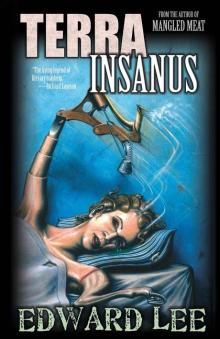 Terra Insanus
Terra Insanus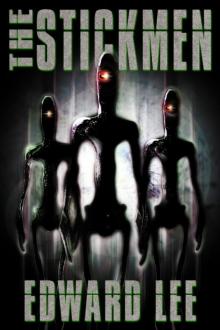 The Stickmen
The Stickmen Flesh Gothic by Edward Lee
Flesh Gothic by Edward Lee Family Tradition
Family Tradition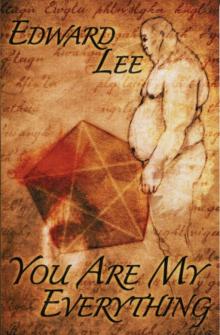 You Are My Everything
You Are My Everything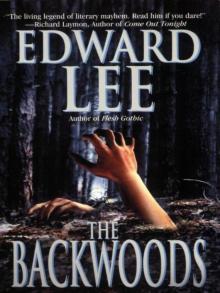 The Backwoods
The Backwoods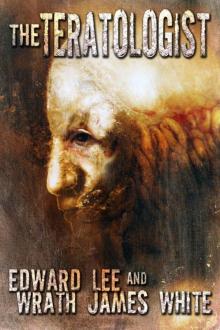 The Teratologist
The Teratologist Smoke and Pickles
Smoke and Pickles Buttermilk Graffiti
Buttermilk Graffiti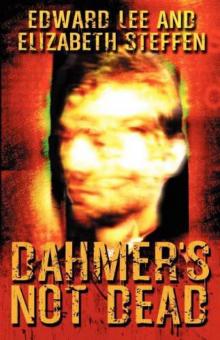 Dahmer's Not Dead
Dahmer's Not Dead Quest for Sex, Truth & Reality
Quest for Sex, Truth & Reality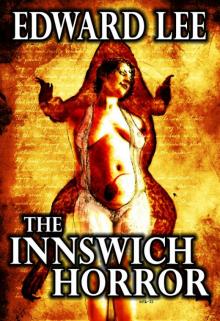 The Innswich Horror
The Innswich Horror Brides Of The Impaler
Brides Of The Impaler Goon
Goon Trolley No. 1852
Trolley No. 1852 Sacrifice
Sacrifice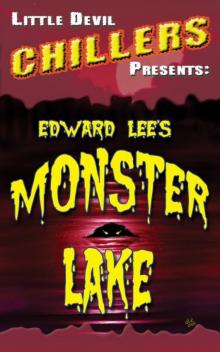 Monster Lake
Monster Lake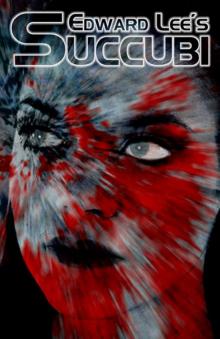 Succubi
Succubi Lucifer's Lottery
Lucifer's Lottery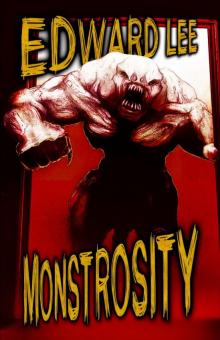 Monstrosity
Monstrosity The House
The House The Dunwich Romance
The Dunwich Romance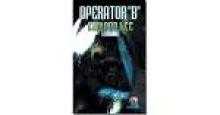 Operator B
Operator B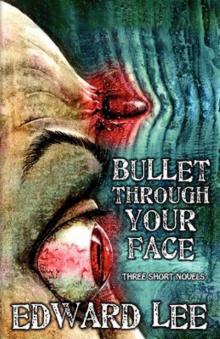 Bullet Through Your Face (improved format)
Bullet Through Your Face (improved format) Grimoire Diabolique
Grimoire Diabolique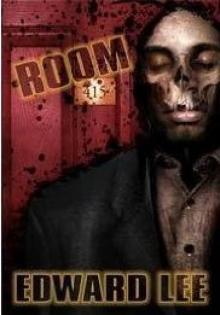 Room 415
Room 415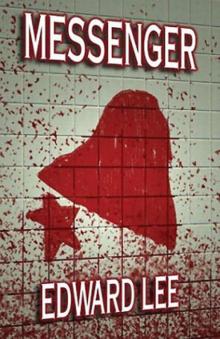 The Messenger (2011 reformat)
The Messenger (2011 reformat)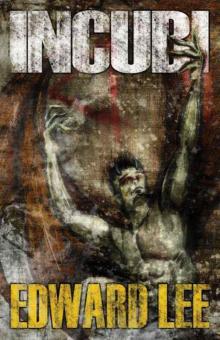 Incubi
Incubi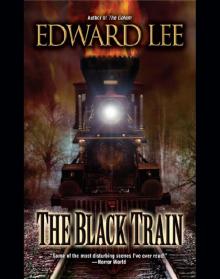 The Black Train
The Black Train House Infernal by Edward Lee
House Infernal by Edward Lee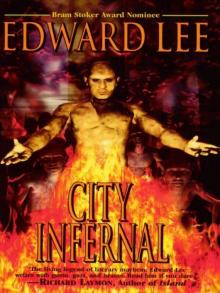 City Infernal
City Infernal Creekers
Creekers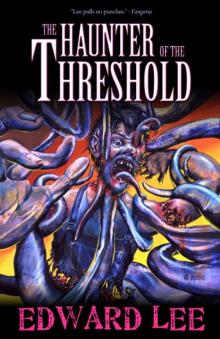 The Haunter Of The Threshold
The Haunter Of The Threshold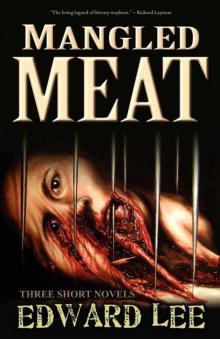 Mangled Meat
Mangled Meat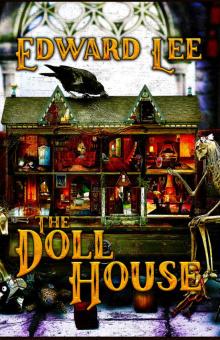 The Doll House
The Doll House Header 2
Header 2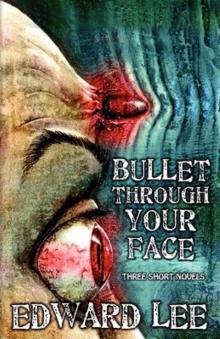 Bullet Through Your Face (reformatted)
Bullet Through Your Face (reformatted)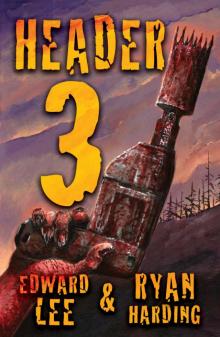 Header 3
Header 3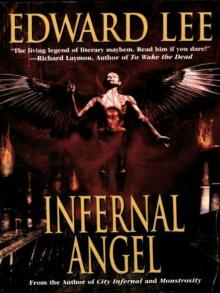 Infernal Angel
Infernal Angel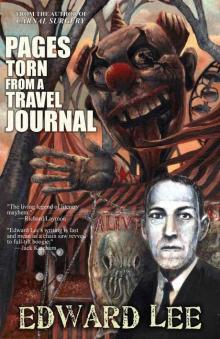 Pages Torn From a Travel Journal
Pages Torn From a Travel Journal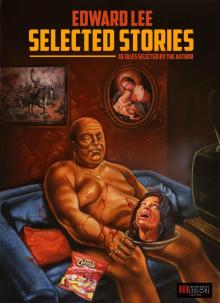 Edward Lee: Selected Stories
Edward Lee: Selected Stories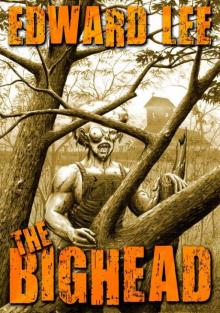 The Bighead
The Bighead The Chosen
The Chosen